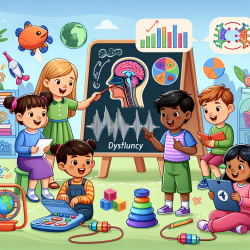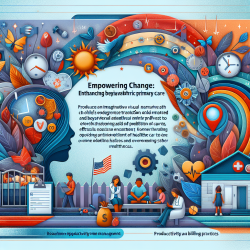Empowering Practitioners: Data Stewardship for Transformative Child Outcomes
In the realm of speech-language pathology, data-driven decisions are paramount to achieving optimal outcomes for children. The recent research titled "Data stewardship in FTLD research: Investigator and research participant views" offers valuable insights into the ethical challenges and opportunities in data stewardship. This blog aims to translate these findings into actionable strategies for practitioners, particularly those involved in online therapy services like TinyEYE.
Understanding Data Stewardship in FTLD Research
The study conducted by Arias et al. (2024) explores the perspectives of investigators and participants involved in frontotemporal lobar degeneration (FTLD) research. This rare condition presents unique challenges in data management, sharing, and participant protection. The research highlights three main themes: perspectives on data sharing, experiences with enrollment and participation, and data management and security.
Key Takeaways for Practitioners
1. Embrace Data Sharing to Enhance Research and Practice
Data sharing is crucial for advancing research, especially in rare conditions like FTLD. Practitioners can apply this principle by collaborating with peers and sharing anonymized data to enhance therapeutic strategies and outcomes. This approach not only accelerates research progress but also enriches the pool of knowledge available for developing innovative interventions.
2. Prioritize Ethical Considerations in Data Management
The study underscores the importance of ethical data stewardship, emphasizing participant protection and informed consent. Practitioners should ensure that data management practices align with ethical standards, safeguarding participant privacy and ensuring transparency in how data is used. This is particularly important in pediatric settings where the protection of sensitive information is paramount.
3. Enhance Informed Consent Processes
Effective informed consent is a cornerstone of ethical research and practice. The research highlights challenges in ensuring participants fully understand consent processes. Practitioners should strive to simplify consent materials and provide clear, accessible information to participants and their families, ensuring they are well-informed about the implications of data sharing and research participation.
Encouraging Further Research and Collaboration
The findings from the FTLD study serve as a catalyst for further research and collaboration among practitioners. By exploring the ethical challenges and opportunities in data stewardship, practitioners can refine their approaches and contribute to the development of best practices in speech-language pathology.
Practitioners are encouraged to delve deeper into the original research paper, "Data stewardship in FTLD research: Investigator and research participant views," to gain a comprehensive understanding of the study's implications. Read the original research paper.
Conclusion
Data stewardship is a powerful tool for enhancing child outcomes in speech-language pathology. By embracing data sharing, prioritizing ethical considerations, and enhancing informed consent processes, practitioners can create transformative impacts in their practice. The insights from FTLD research provide a roadmap for navigating the complexities of data stewardship, ultimately leading to better outcomes for children and their families.










